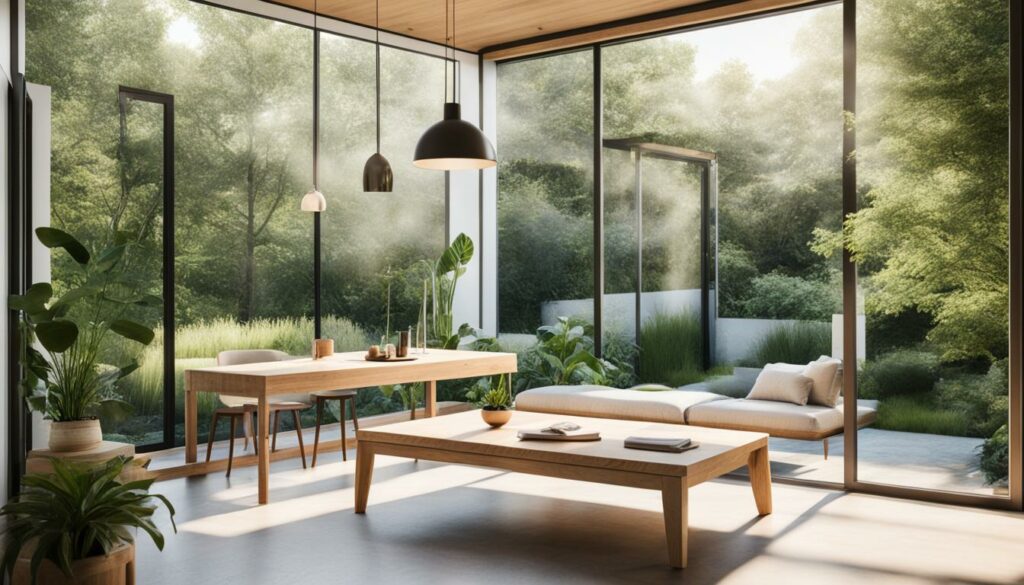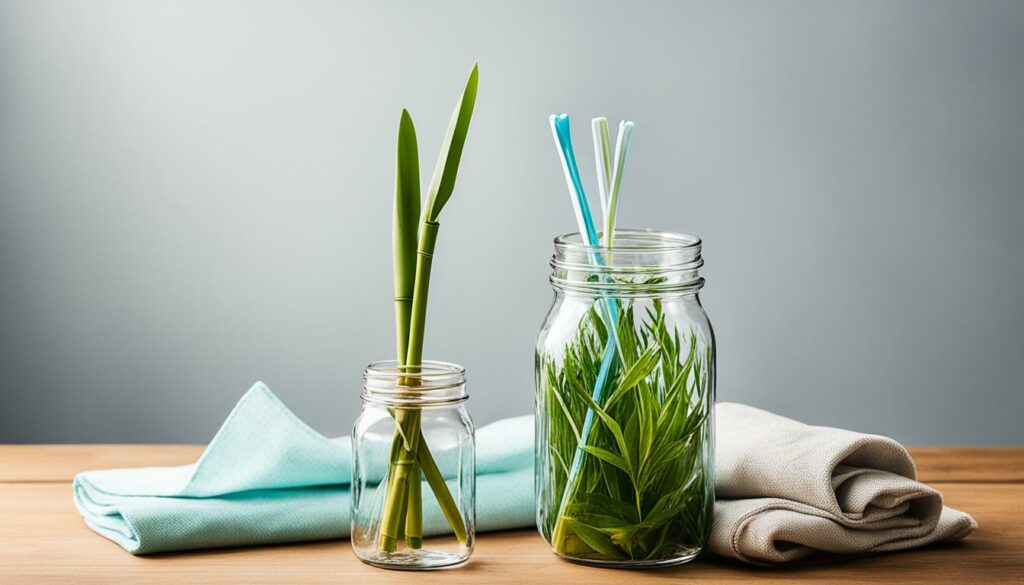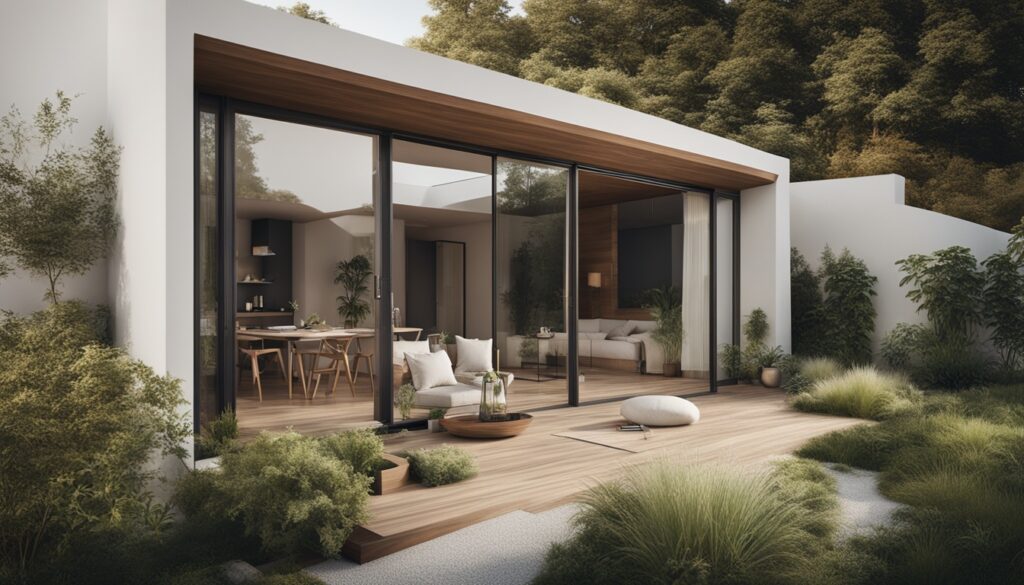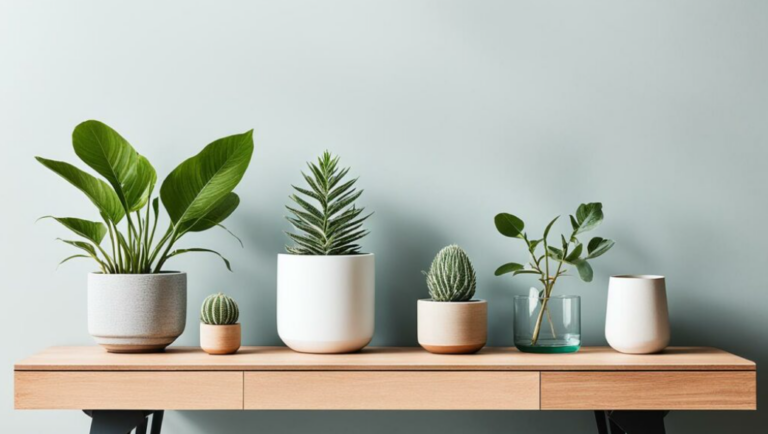In today’s world, filled with too much stuff and endless digital noise, the idea of living simply is very tempting. We all want to simplify, declutter, and focus on what’s really important. This journey to a more meaningful life is one I’ve taken, finding purpose and clarity along the way.
Minimalist living isn’t just about having fewer things. It’s a way of life that touches our relationships, money, and happiness. By living minimally, we can free up time, energy, and focus. This lets us live more thoughtfully and clearly.
Key Takeaways
- Minimalist living helps simplify and declutter our lives, reducing stress and distractions.
- Embracing a capsule wardrobe and the tiny house movement can lead to greater financial freedom.
- Voluntary simplicity and mindful living cultivate presence, gratitude, and a deeper connection to what truly matters.
- Ethical consumption and a zero-waste lifestyle can reduce our environmental impact.
- Minimalist living communities provide support and inspiration on the journey towards a simpler, more fulfilling life.
What is Minimalist Living?
Minimalist living is all about focusing on what’s really important and cutting down on stuff. It leads to feeling free, less stressed, and happier. It’s about living with purpose and enjoying the simple things in life.
Defining the Minimalist Lifestyle
Minimalism is about being intentional with our choices. We pick what’s truly important to us and let go of the rest. This might mean decluttering our homes, wearing fewer clothes, and thinking carefully before buying things.
The Benefits of Living with Less
- Reduced financial burden and increased financial freedom
- Less time spent maintaining and organizing possessions
- Decreased stress and anxiety associated with material excess
- More time and energy to focus on personal growth, relationships, and experiences
- Reduced environmental impact through conscious consumption
| Benefit | Description |
|---|---|
| Increased Focus | Minimalist living allows us to eliminate distractions and devote our attention to what truly matters. |
| Improved Mental Well-being | By living with less, we can reduce stress, anxiety, and the sense of being overwhelmed. |
| Environmental Sustainability | Minimalism encourages conscious consumption and reduces our carbon footprint. |
“The joy is in the journey, not the destination. Embrace the process of living with less, and you’ll discover a newfound sense of freedom and fulfillment.”
Decluttering: The First Step
Decluttering is a key step towards living minimally. It means sorting out what we really need and letting go of the rest. This makes our living spaces more organized and gives us more time and energy for what’s important.
Identifying What Truly Matters
Decluttering starts with looking at our stuff closely. We need to think, “What items really add value and happiness to my life?” This helps us see what’s truly important and what we can do without. It leads us to a more focused and tidy life.
Letting Go of Possessions
After picking what’s important, it’s time to let go of the rest. This step can be hard but freeing, as we learn to let go of our things. Donating, recycling, or getting rid of items responsibly helps us live in a way that matches our values.
| Decluttering Strategies | Benefits |
|---|---|
| Adopt the “one-in, one-out” rule | Prevents the accumulation of unnecessary items |
| Digitize important documents | Reduces paper clutter and makes information more accessible |
| Organize possessions by category | Enhances visibility and facilitates decision-making |
Starting with decluttering leads us to a more organized, meaningful life. It helps us focus on what’s really important. This leads to a deeper sense of purpose and happiness.
Embracing a Capsule Wardrobe
Exploring minimalist living leads us to the capsule wardrobe. This method simplifies our daily choices and supports ethical consumption and minimalist living.
A capsule wardrobe means having a few, high-quality items that can be worn in many ways. This limits the choices we face each day. It helps us focus on a style we love and supports sustainable fashion.
Here are the key benefits of a capsule wardrobe:
- Reduced Clutter: Fewer clothes mean a tidy, peaceful space and a minimalist living mindset.
- Increased Versatility: With a well-chosen wardrobe, we can make many outfits, avoiding the “I have nothing to wear” problem.
- Ethical Fashion Choices: Choosing quality items for our capsule wardrobe supports sustainable fashion. It helps the planet and promotes thoughtful buying.
Starting a capsule wardrobe might seem hard, but the benefits are huge. It simplifies our lives and helps the environment and our health.
“Minimalism is the intentional promotion of the things we most value and the removal of everything that distracts us from it.”
As we move towards minimalist living, the capsule wardrobe shows our dedication to simplicity and sustainability. It helps us live with less, gaining freedom and clarity.
Minimalist Living and the Tiny House Movement
The tiny house movement is closely linked with minimalist living. Downsizing your living space can bring freedom and financial independence. This section will look at how these two ideas meet and the benefits they offer.
Downsizing Your Living Space
The tiny house movement is all about living in smaller spaces. People choose homes that are 100 to 400 square feet. This means they must pick their belongings carefully to fit in the small space.
The Freedom of Minimalism
Living in a tiny house brings a new kind of freedom. With fewer things to take care of and lower living costs, people feel free from financial stress. They can spend more on experiences and saving money, leading to a simpler life.
| Benefits of the Tiny House Movement | Benefits of Minimalist Living |
|---|---|
| Reduced living expenses Increased mobility and flexibility Smaller environmental footprint | Greater focus and clarity Reduced stress and anxiety More time and resources for experiences |
Combining minimalist living with the tiny house movement brings many benefits. It leads to more financial freedom, care for the environment, and better well-being.

“The tiny house movement is not just about downsizing; it’s about living intentionally and prioritizing what truly matters.”
Voluntary Simplicity: A Mindful Approach
We often look for a better, more sustainable way of living. Voluntary simplicity is a key part of this search. It’s about choosing a life filled with experiences, not just stuff.
At its core, voluntary simplicity means finding joy in the basics. It teaches us that happiness comes from meaningful relationships, personal growth, and connecting with nature. Not from having lots of things.
Choosing voluntary simplicity means starting a journey of mindful living. We think deeply about what we need and value. This helps us let go of the unimportant, making room for what really counts.
This way of living, known as minimalist living, brings us freedom and joy. We start to live in harmony with our natural pace. We find happiness in the simple things around us and the depth of our experiences.
“The true secret of happiness lies in taking a genuine interest in all the details of daily life.” – William Morris
By going for voluntary simplicity, we let mindfulness and gratitude shape our choices. This leads to a life that’s more meaningful and good for the planet.
Ethical Consumption and Zero Waste
Living minimally draws us to ethical consumption and a zero-waste lifestyle. These ideas help us lessen our environmental impact. They make us think more about what we buy.
Reducing Your Environmental Impact
Living minimally means caring for the planet. By choosing zero-waste, we cut down on single-use plastics and food waste. We pick products made to last and fixable. This reduces our personal impact and tells companies we want eco-friendly options.
Conscious Consumerism
- We think deeply about the effects of our purchases.
- We look for companies that make things sustainably and treat workers fairly.
- Our spending shows what we value, pushing for change in the market.
| Sustainable Product Category | Examples |
|---|---|
| Clothing and Accessories | Organic cotton, recycled polyester, fair trade apparel |
| Household Goods | Bamboo products, refillable cleaning supplies, reusable bags |
| Electronics | Certified e-waste recycling, energy-efficient devices |
Choosing a minimalist living lifestyle means caring for the planet. We focus on ethical consumption and zero waste. This way, we live simpler and help create a greener future.

Financial Freedom Through Minimalist Living
Living a minimalist lifestyle can lead to financial freedom and security. It means simplifying our lives and focusing on what’s important. This way, we can cut costs, pay off debt, and save for our goals and experiences.
At the heart of minimalist living is letting go of unnecessary items. Decluttering frees up space in our homes and minds. It also helps us save money since we don’t need to buy, store, or replace things we don’t use.
Choosing a minimalist lifestyle can also change how we think about housing. Downsizing or living in a tiny house can lower our rent or mortgage, utilities, and upkeep costs. These savings can go towards paying off debt, investing, or following our dreams.
| Expense Category | Minimalist Lifestyle | Traditional Lifestyle |
|---|---|---|
| Housing | $800/month | $1,500/month |
| Utilities | $150/month | $300/month |
| Transportation | $100/month | $400/month |
| Total Monthly Savings | $1,050/month | N/A |
By choosing minimalist living, we cut our monthly costs and free up money for the future or our passions. This financial freedom lets us make choices that matter. We can try new careers, retire early, or live life on our terms.
“The key to financial freedom is to live life on your own terms, not on the terms imposed by others.”
Mindful Living: Finding Balance
Minimalist living is all about finding balance and mindfulness. It helps us live more intentionally. This way, we can feel more present, grateful, and focused. It lets us live truly and find peace within.
Cultivating Presence and Gratitude
Living simply means being fully in the moment. It means ignoring distractions and enjoying life’s simple joys. This way, we can appreciate the beauty around us and feel thankful for what we have.
Letting Go of Distractions
Our world is full of information and distractions. Minimalist living teaches us to ignore these and focus on what’s important. By clearing our spaces, we can connect better with ourselves and others.
Minimalist living is more than just having fewer things. It’s about finding balance and being thankful for our lives. By letting go of the unimportant, we find a deeper sense of peace and fulfillment.
Overcoming Challenges on the Journey
Living a minimalist lifestyle can change us deeply, but it comes with challenges. When we start to declutter and simplify, we might hit roadblocks. Yet, with the right mindset and plans, we can get past these and enjoy the perks of simple living.
One big challenge is feeling pressured to keep up with a consumerist way of life. Friends, family, and coworkers might not get why we want to live with less. It’s key to stick to our beliefs and explain why we choose minimalist living. Having a circle of people who get it can make a big difference.
It’s hard to let go of things we hold dear. Saying goodbye to items with memories or value can feel like a loss. To get past this, focus on the good things decluttering brings, like more space and clarity. Doing mindful acts, like thanking the items we’re letting go of, can help us move on.
Switching to a simple living way of life also brings practical hurdles. We might need to change how we spend money, find a new daily routine, or figure out downsizing. By breaking things down into smaller steps, setting realistic goals, and getting help from others, we can make this change smoother.
The challenges we meet on our minimalist living path are chances for growth and learning. By facing these challenges with courage, kindness, and a readiness to learn, we can deepen our commitment to a more meaningful, satisfying life.
Inspiring Minimalist Living Communities
Across the United States, many people and families have taken up minimalist living and simple living. They’ve found happiness, connection, and a common goal in their minimalist journeys.
The Tiny Home Village in Spur, Texas, is one such place. It’s filled with small, energy-saving homes. People here enjoy the freedom and joy of minimalist living. They’ve built a close community around shared values and love for nature.
In Ithaca, New York, the Ecovillage shows what sustainable living and community-based decisions look like. This minimalist living spot is a model for city renewal. It has shared gardens, green energy, and focuses on ethical consumption and zero waste.
| Community | Location | Key Features |
|---|---|---|
| Tiny Home Village | Spur, Texas | Compact, energy-efficient homes, tight-knit community, focus on freedom and joy |
| Ecovillage | Ithaca, New York | Sustainable living, community-based decision-making, shared gardens, renewable energy, ethical consumption and zero waste |
These minimalist living spots and others like them inspire those wanting to simplify and find more meaning. By living by minimalist principles, they’ve made vibrant, green, and connected lives. They offer a blueprint for others on a similar path.

“The greatest wealth is to live content with little, for there is never want where the mind is satisfied.” – Lucretius
Conclusion
In this journey, we’ve seen how living simply can change our lives. By getting rid of clutter and focusing on what’s important, we gain freedom. This freedom lets us focus on our priorities, our relationships, and growing as individuals.
Living minimally means more than just saving money. It also makes us more mindful, helps us make better choices, and brings balance to our lives. Saying goodbye to the clutter and distractions, we’ve found a richer life.
If you’re starting or have been on this path, we hope this article has inspired you. As you go forward, may you face challenges with strength and stay true to your simple living goals. May you enjoy the freedom, clarity, and deeper connections that come with this way of life.
FAQ
What is minimalist living?
Minimalist living is about focusing on what’s important and having fewer things. It’s about living with purpose. This way, we feel free, less stressed, and happier.
What are the benefits of living with less?
Living with less means less stress and more focus. You’ll have more money and a deeper connection to life. It lets us use our time and energy on what really matters.
How do I start decluttering my life?
Start by sorting out what’s really important to you. Let go of the rest. This makes your space more organized and your life more intentional.
What is a capsule wardrobe, and how can it benefit me?
A capsule wardrobe means having a few, high-quality clothes that you can mix and match. It helps you decide what to wear faster, boosts your style, and supports sustainable fashion.
How does the tiny house movement relate to minimalist living?
Tiny houses are a big part of minimalist living. Living in a smaller space gives you freedom and saves money. It’s all about living simply.
What is voluntary simplicity, and how does it connect to minimalist living?
Voluntary simplicity is about choosing to live with less on purpose. It’s about valuing experiences over stuff and finding happiness in a simpler life.
How can minimalist living help me achieve financial freedom?
Minimalist living cuts down on spending and helps you pay off debt. You can use your money for what really matters. It’s a way to be more financially free.
How can minimalist living help me cultivate mindfulness and balance?
Minimalist living is all about being mindful and balanced. It helps you focus on the present, be grateful, and live with purpose. This leads to inner peace.
What are some common challenges of minimalist living, and how can I overcome them?
Living minimally can be tough, like dealing with pressure from others or letting go of memories. But with kindness to yourself and a positive attitude, you can get past these hurdles.
Where can I find inspiration and support for my minimalist living journey?
There are many people and families around the world living minimally. Connecting with them can give you the support and motivation you need to keep going on your path.
- Growing Bonsai: Tips for Miniature Tree Enthusiasts
- Buying Bonsai: Tips for Selecting Your Perfect Tree
- Bonsai Potting: Essential Tips for Tree Care Success
- Bonsai Maintenance: Essential Care for Tiny Trees
- Mastering the Art of Shaping Bonsai: A Beginner’s Guide
Source Links
1 -The Plain Simple Life
2 -Mindful Nomadics


